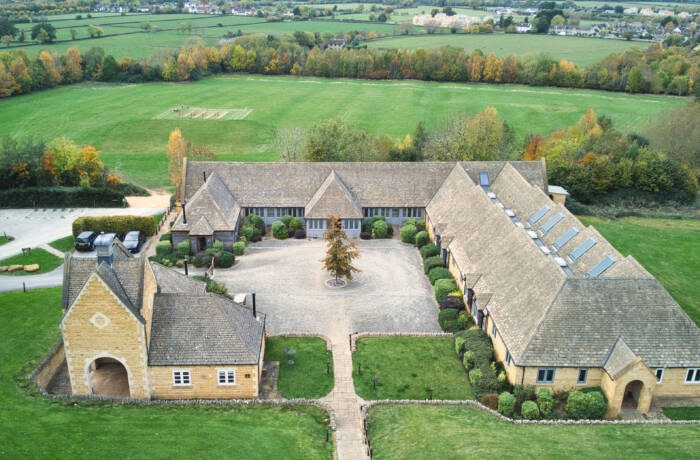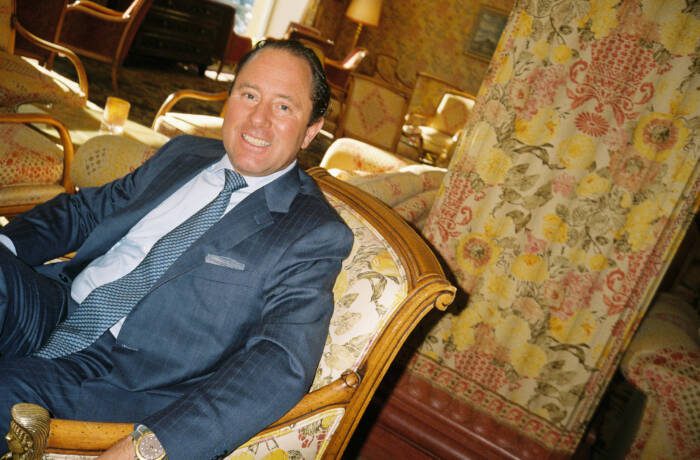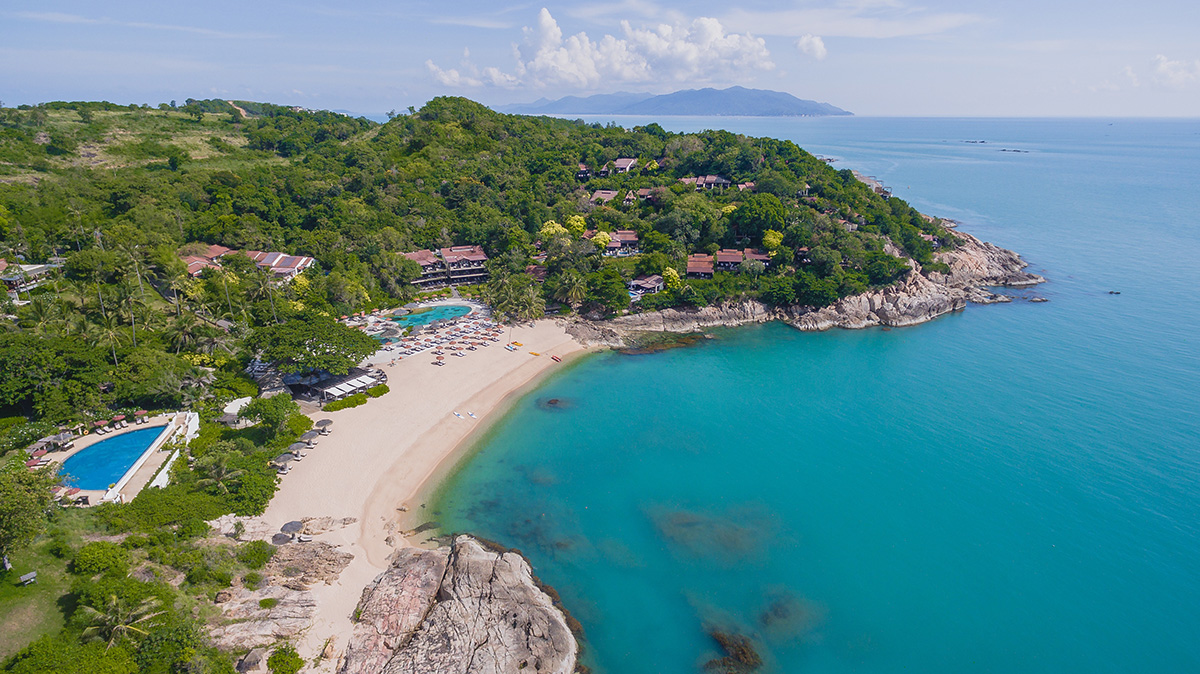
The Tongsai Bay is an eco-friendly luxury resort on the tropical island of Koh Samui
The Tongsai Bay is a family-owned luxury resort on the island of Koh Samui in Thailand. Set amidst acres of wild tropical landscape, the resort is dedicated to wildlife conservation and sustainable practices. Here, we speak to the resort’s owner Gob Thanakorn about continuing his father’s vision, the challenges of promoting sustainability and why Thailand needs to combat over-development
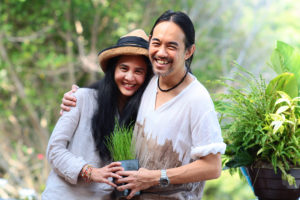
Gob Thanakorn with his wife Goya
1. How was the concept for The Tongsai Bay born?
Tongsai was a brain-child of my late father Akorn Hoontrakul. He was CEO of the Imperial group of hotels, which our family owned 100%. When he decided that it was time to grow and venture out of Bangkok, he surveyed Koh Samui because he thought that Phuket was already developed and Samui had a great potential even though there wasn’t an airport back then. A survey team was sent and I was lucky enough to be on that trip as a 12-year-old. We took the night train from Bkk to Poonpin district in Suratthani (you can still do this part today) and somehow got on a naval ship from Suratthani to Koh Samui. I remember Tongsai as a little piece of backpacker’s paradise. There were only 8 bungalows and a snack hut with green snake on the ceiling. There was a lady without anything on the bottom going for a swim in the sea. Out of all the beaches I saw on that trip, I liked Tongsai the least because of the deep water and course sand. As a 12-year-old, I didn’t think much about the fact that it was a private beach and how beautiful it was being a cove all to itself. This was back in 1986.
Follow LUX on Instagram: luxthemagazine
My father then went on a separate trip and he bought the land of Tongsai (the bay and beach was called Tongsai Bay before we even bought the land) within 7 days of laying eyes on it from the sea. He later said to friends that “it was love at first sight”. My father spent 3 months planning how he wanted to develop his resort with an eye on making it his retirement home. He literally slept on the beach during this time. There’s a picture to prove it.
When Tongsai was opened in 1987, it was the first five star hotel on Koh Samui. My father used the tagline “….where mother nature was the architect”. So the concept always was that Tongsai would be a hotel nestled within existing natural beauty of Koh Samui where space is in abundant and privacy is key. Supporting evidence can be found in many of the guest rooms where cottages were built over rock formations instead of blowing it. We have two rooms that have rocks inside the room next to the bed. They used to be called Rock suites. Cottage 235 was taken out of inventory during the renovation years of 1995 because a large Banyan Tree would have to be taken down. Dad chose the tree over a room. According to him, he tried to save as many large trees as possible during the construction of the hotel. Going around them, leaving space for coconut trees to rise through terraces was how he avoided cutting trees. Tongsai Pool Villa 511 used to be called the Mango Villa because a twin wild mango trees are in the middle of the terrace. They still stand today – guests can have complimentary wild mangoes when it’s the season to bear fruit.
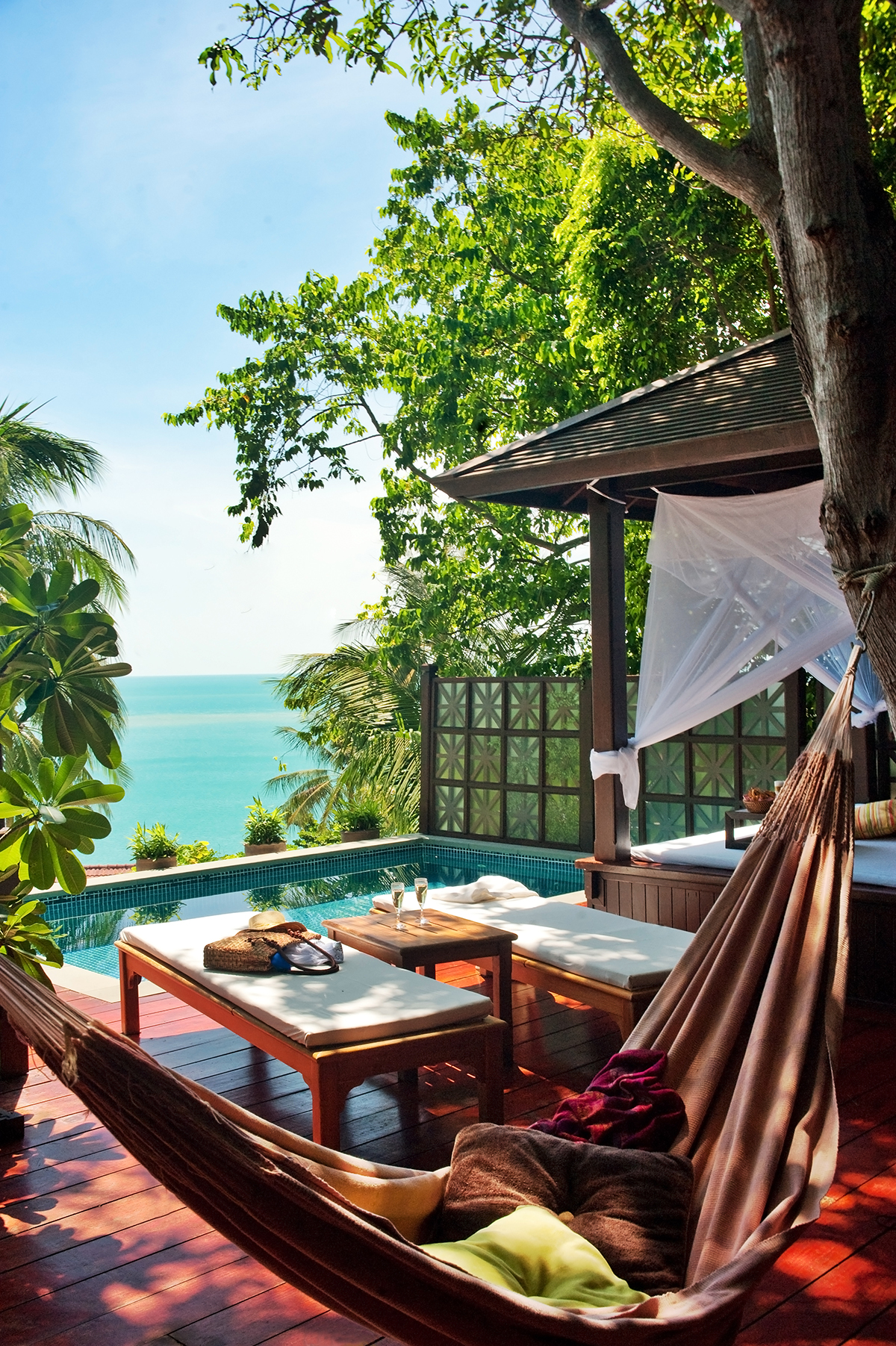
The terraces provide guests with large outdoor living spaces and stunning sea views
As we developed the Tongsai Grand Villas in 1998, the “great outdoor living” concept was used to promote the new villas because of the size of the terrace on each villa. We emphasised the outdoor area more than the indoor air-conditioned area because guests liked to be outside more than inside. So a gazebo was a main feature along with the “bathtub on the terrace” which later made Tongsai famous for being the hotel with a bathtub with sea views.
When dad died in 2002, my wife and I took over the responsibility We had lived and work at Tongsai for a few years and learnt that we used to appreciate nature, but we never thought about protecting it. We encountered a Slow Loris, a nocturnal mammal one night coming back from a late night out and we realised that Tongsai is a home for wild animals living freely and safely. So we put in place measures to protect all kind of animals in the hotel ground including firing staff who are caught killing or hurting animals. Any dead animal will have to be reported and sent for autopsy by a local vet to determine if it died of natural causes or by humans. If it was by human actions, further investigation will pursue. So far we have never fire anyone because of this reason yet. But the message was loud and clear for our staff who now act as eyes and ears for animal protection.
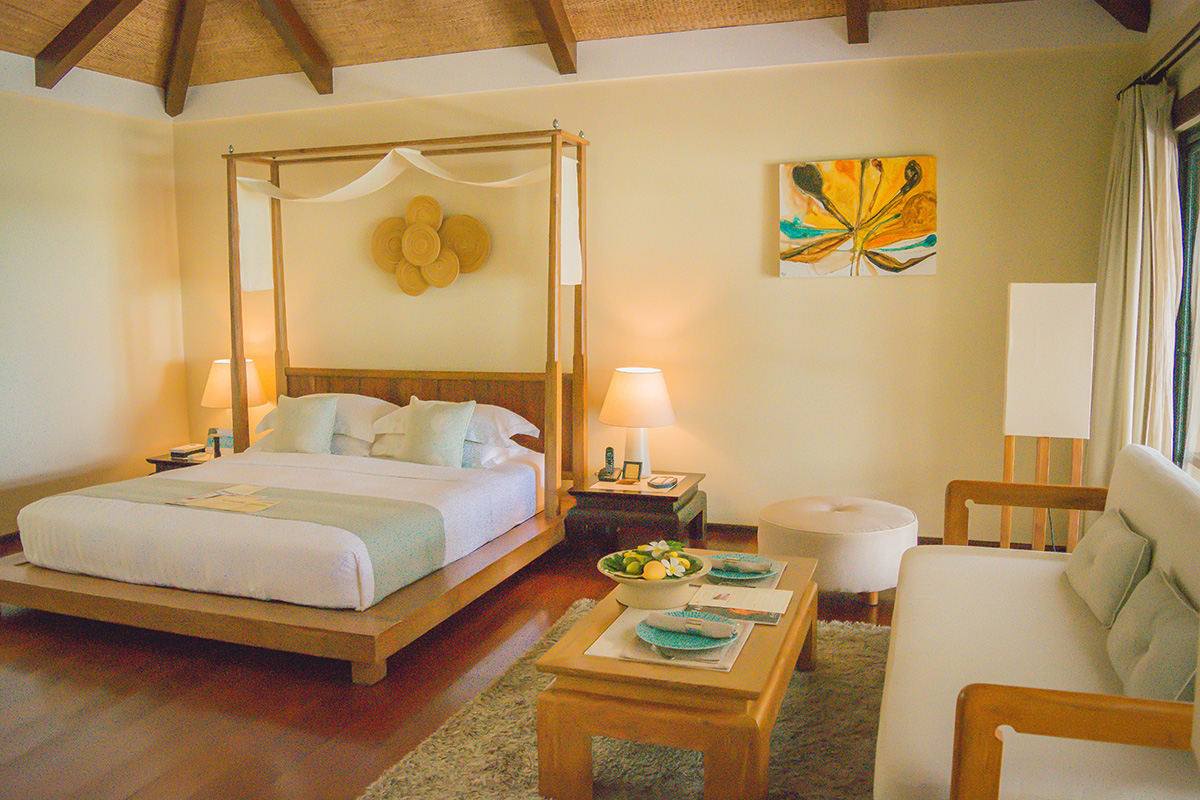
The bedroom of a Grand Villa
We have had bird watchers do a survey found 60 plus kinds of birds in a year. Monitor lizards could be seen swimming in the sea (and occasionally the main swimming pool!), climbing coconut trees or lazily walking the lawn. There are squirrels and tree shrews abound. The occasional fireflies can also be spotted at night around Sept to Oct. In order to achieve this, we completely ban all chemical usage in natural space in the hotel so no pesticides, insecticides or chemical fertilisers are used at all.
It is also worth noting that we are resentful of animals in captivity and forced labour so therefore we do not help guests to book elephant rides, visit zoos/aquariums or circuses. We support the elephant sanctuary where “retired” elephants are fed and left to live a peaceful life in a larger confinement, but unchained. It’s a long answer but you could see how in 32 years the concept had grown but the core remains. That’s why we claim to be “natural to the Core”.
Read more: British model Anna Proffitt on the need for slow fashion
2. What are some of the challenges you face in providing a sustainable luxury service?
I’d put it down to the added work and steps that are required for staff to go to the length of being sustainable. It’s almost the opposite of being convenient for many people in Thailand. You talk about waste and people think cleaning the beach and putting rubbish in the bins. We say we have to know the rubbish first and then we can know how to treat it. Food waste, for example, can be mixed with organic garden waste to make fertilisers so it’s not too bad but the gardeners will say that it’s added work for them. Non-biodegradable waste can be sorted, but that’s not solving the problem at the root cause. It’s better to find substitutes and use recyclable or purely biodegradable. So we opt to buy drinks in glass bottles only – we won’t buy from brands that use plastic containers – but this adds extra work for our beverages staff who feel that glass bottles are heavier whereas a single use plastic bottle is much more convenient and less work. We use lemongrass straws instead of plastic straws too – it’s simple things like this that can reduce non-biodegradable waste. Auditing is also hard and can come across as unfriendly and potentially cause rift with some departments. Sometimes it costs more to source more environmentally friendly products in terms of money, but also time. Educating suppliers can also be draining. Thailand is a society where convenience is king. It’s very difficult to challenge this culture.
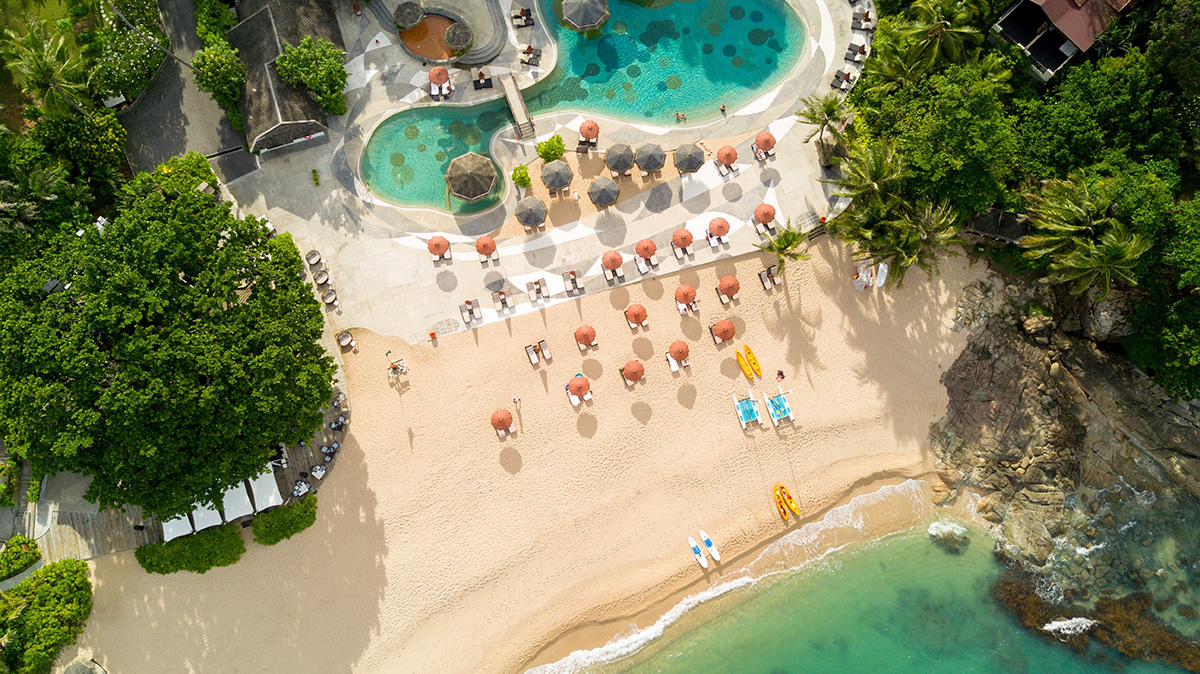
The main pool sits on the edge of the beach
3. What’s your proudest sustainability initiative at the resort?
I’d say the fact that we continue to find Slow Loris in the hotel ground speaks volume about how natural this place is and that can only be a result of the measures we have put in place to protect animals and the natural surrounding in the hotel. We didn’t expand in terms of number of rooms so we didn’t have to cut down trees to open ways for more buildings. I suppose we are proud to say that if you look up Google Earth you will see a patch of 25 acres that is greener than the surrounding pieces of land. We are an oasis for animals surrounded by developments dominated by concrete.
Read more: Inside Mandarin Oriental Geneva’s Royal Penthouse Suite
4. How would you like to see the hospitality industry change over the next few years?
I hope there are less developments since there’s already an over-supply of hotels and villas for sale on Koh Samui and in many other parts of Thailand. The ones that try to keep nature intact are more commendable than others whilst most who would clear all trees first then replant later, which destroys natural habitat for local animals and thus reduces the biodiversity tremendously. I guess it’s wishful thinking, but I think Thailand needs to exercise and enforce its regulations in order to combat overdevelopment fairly and equally. If the law says you need to have functioning waste water plants, then all hotels and restaurants must abide. Sadly, it’s not the case and the authorities don’t even check on a regular basis or follow up with action plan. If the law says you need to have 50% green area then they should be audited regularly and equally too. Ultimately, if mankind can realise that it’s of utmost importance to even just recognise the value of biodiversity (especially in the tropical zones where biodiversity is higher) and act to protect it, we may have a chance to live in a balanced world. If we do all we can to preserve or even increase the biodiversity of the natural world, we will be able to enjoy a quality of life equally. Nature conservation, in the end, is an effort to preserve that biodiversity since it’s the most important indicator of how healthy the natural world is. We have gone too far to destroy the earth and still many are refusing to accept the fact that humans are the cause of the imbalance. It’s time to be responsible humans, which applies to everything you do in the hospitality industry.
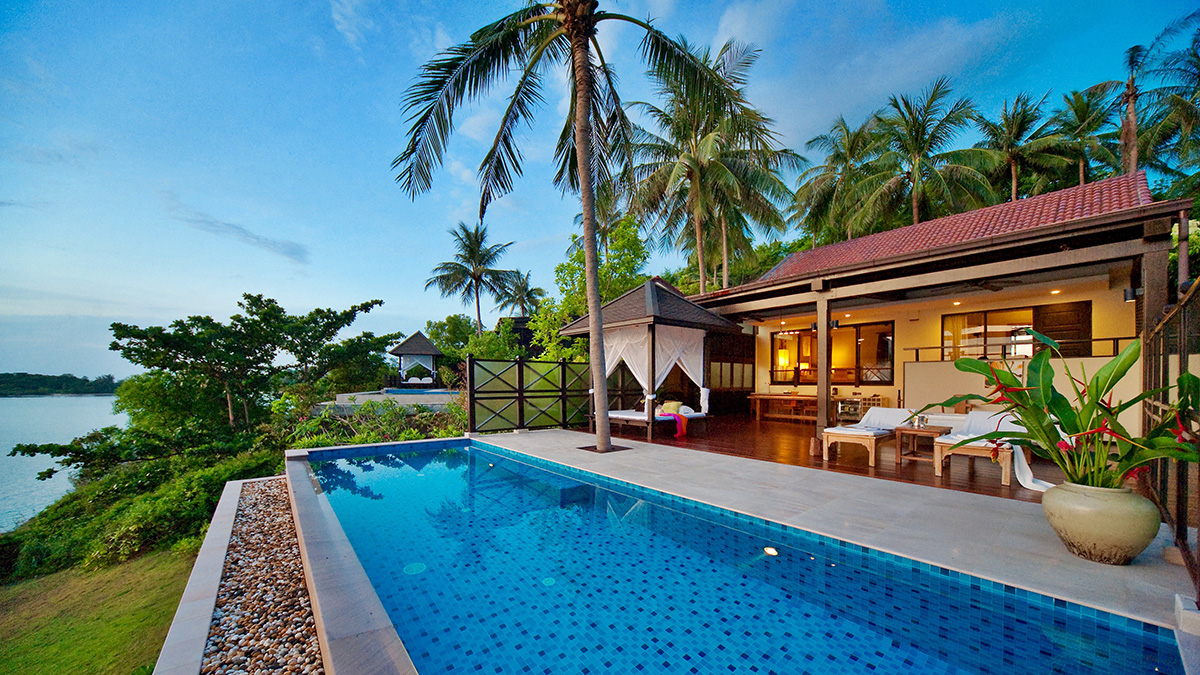
One of the resort’s luxurious pool villas
5. What are your 3 top tips for travelling sustainably?
Respect the nature and the culture wherever you go. Be responsible when it comes to littering or choose to consume wisely, considering what is biodegradable and what is not. Basically, try your best not to use single use products especially water. Also be aware of activities that involve animal forced labour and just don’t support them.
6. And finally – what’s your best kept secret on the island of Koh Samui?
It’s a secret!
Find out more: tongsaibay.co.th

